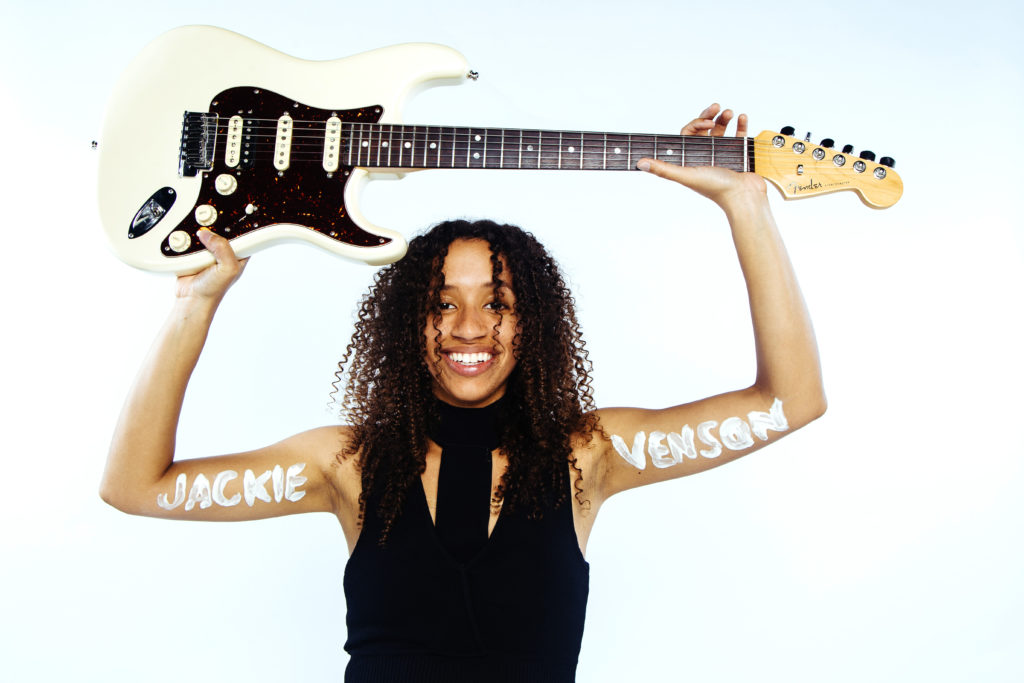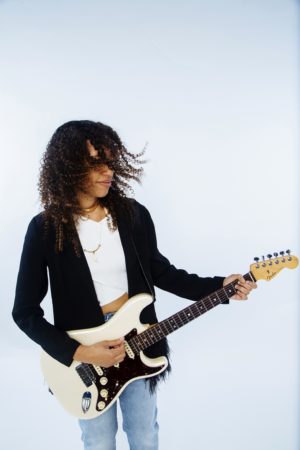Overflowing with raw talent, grit and soulful blues, 26-year-old singer-songwriter Jackie Venson is forging her own path in Austin’s music scene with a unique, eclectic sound.
By Danielle Ransom, Photos by Jinni J.

Fresh off her 2015 European tour, 26-year-old Jackie Venson is bringing new music to Austin this August and September. She’s currently busy gearing up for the Sept. 16 release of her first live album, Jackie Venson Live, which will kick-start her tour across the U.S.
Among her applause-worthy accolades, Venson was recently named one of the 10 Black Emerging Guitarists You Need to Pay Attention to by She Shreds Magazine for her superb musicianship.
Austin Woman stole a few minutes of her time offstage to chat about her love for music and the joy she wants listeners to take away from her first live album.
Austin Woman: To get started, what first drew you to music and inspired you to pursue a career in the industry?
 Jackie Venson: My dad [Austin music icon Andrew Venson] was a bass player and singer. He was in the scene for 30 years and just retired five years ago. My mom is also a big music lover. She could be a musician, but she’s not.
Jackie Venson: My dad [Austin music icon Andrew Venson] was a bass player and singer. He was in the scene for 30 years and just retired five years ago. My mom is also a big music lover. She could be a musician, but she’s not.
AW: How central were your parents in getting you on the path you’re on now?
JV: Oh my god, they were crucial. [My mom] insisted I take music lessons in piano because she thought piano was a good starting instrument. Piano is the foundation of a lot of things. Then my dad had a room in the back of the house converted into a rehearsal station, so, I would hear his band rehearsing all the time, twice a week at least. And listening to a professional band twice a week was a really big deal. I learned what a band should sound like from that.
AW: How did having a father who was prominent in the music scene affect your love for music?
JV: My dad was crucial [to my music career]. He probably shortcut five years off of my entire journey. It would have taken me years to learn through trial and error some of the things he just told me. Instead, he made all of the mistakes and told me what to do. When I was 16, he let me play in his band. At the time, I was playing the keyboard and was starting to drift away from classical music and I wanted to do something else. I started taking jazz piano lessons as well as classical piano lessons. He let me play with his band to learn jazz, so, I got band experience with professionals who had been playing for 30 years before I even went to college. By the time I got to Berklee, I was ahead. They had classes where they do the exact same thing of bringing in professionals to teach you how to be a part of a band or ensemble. I don’t know what I would have done without [my dad]; what he gave me was really huge.
AW: How did the transition in musical style from a piano to guitar feel?
JV: What’s wild is I think the transition actually happened when I was really young, but I just didn’t know it at the time. My dad played blues, Motown, R&B and other stuff that I would hear twice a week. I heard that sound constantly and even though I was playing classical piano, I always liked how that music sounded. So, when I was looking for my next sound, I [decided to go] with blues.
AW: What is the driving force and inspiration behind your music?
JV: Before, I would write music based on observation. So, I would observe what somebody else was going through and write songs from their point of view. I always found that cool, but I also found that it’s much easier to connect with songs when you have directly gone through the experience.
Lately, I’ve been writing a lot of music just based on my experiences. The older you get, crazy things are bound to happen to you. So, I’ve been drawing on that. These last few years, I’ve been going through a lot of weird stuff—sometimes good and sometimes bad—and I find those songs have a lot more depth.
AW: Do you believe music should make a statement?
JV: I do think all songs make a statement in one way or another. It may be a shallow statement, but it’s a statement nonetheless. Some people like music with shallow statements and others with deeper statements. It all just depends on your taste.
AW: How has being a woman, and an African-American woman, at that, shaped your experience in the industry?
JV: I think I face a lot more discrimination than I can immediately tell. But I don’t like to automatically think that and assume. Assumption leads to a lot of misery, just in general. I do think being a woman has shaped my experience because I have to be nice and everyone expects me to be like their mom. I’ll say stuff that’s really harsh and really blunt and if I would have been a man and said it, they’d be like, “Yeah, I’m totally on the same page as you!” but since I’m a woman, they’re like, “Whoa, that’s really harsh.” I’m like, “I know I’m wearing a skirt and my hair is pretty, but let’s get real.” People don’t like to hear that kind of stuff from women. Sometimes, I have to be soft, but I also have to be assertive at the same time.
AW: What’s something you’re looking forward to ahead of your performances in August and September?
JV: Honestly, I’m just really excited about these new songs. I’ve written a bunch of brand-new songs that people haven’t heard yet. The band hasn’t even heard them yet and I’m excited to hear the parts they come up with. All these new songs are so different from everything that I’ve written.
AW: What makes these songs stand out?
JV: They’re way more hypnotic. They get stuck in my head even. A lot of my songs don’t get stuck in my head because I don’t really think about them after they are written. But, with these songs…I want to hear them like they’re not my songs. Also, I’m playing with a drummer and the groove he brings to the music is just perfect. I’m just so excited.
AW: If you had to choose one song from your discography, which one is your favorite and why?
JV: I’m going to have to say “Always Free” because the combination of the drumbeat and bass is wild. The groove is so disgusting and every time I hear this song, I kind of lose it. It sounds funkadelic. During the live recording, I had just bought a new guitar and that was the second day I had it and I stumbled on the perfect tone with this guitar. Everything just came together and exploded on this entire CD. I can’t wait for people to hear it; they’re going to flip.
AW: You’ll be touring the West Coast after your album release Sept. 16. How do you feel the music climate in Austin compares to some of the other places you’ve visited?
JV: As a solo performer, traveling to Europe was really different because it was like I had come from a different planet and people were really excited to hear this new sound; the music created this really exciting energy. In America, people are a little more spoiled. There is a lot of really great music in this country and people take it for granted. At the same time, people still like to hear new things. They might come in a little jaded and leave enjoying it. The feeling of blowing away someone’s expectations is exciting. It’s like a seal of approval almost.
AW: What do you hope your fans take away from your new album and your upcoming live performances?
JV: The guys [in the band] and I really enjoy playing together, and I think that comes through the recording. Hopefully, the [audience] gets a huge infusion of joy, like they’ve just been punched in the face by joy, pure joy.








